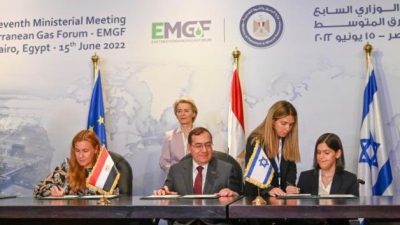Human Rights Groups Denounce EU’s Gas Deal with Israel
The Europe Union is looking for alternative sources of gas supply in an attempt to reduce dependence on Russian gas following sanctions imposed against the country after its attack on Ukraine

All Global Research articles can be read in 51 languages by activating the “Translate Website” drop down menu on the top banner of our home page (Desktop version).
To receive Global Research’s Daily Newsletter (selected articles), click here.
Visit and follow us on Instagram, Twitter and Facebook. Feel free to repost and share widely Global Research articles.
***
The European Union (EU) announced a tripartite natural gas export deal with Israel and Egypt on Wednesday, June 16, claiming that it will be a crucial alternative to Russian gas imports. The three parties are looking to build infrastructure which will be “fit for renewables,” said EU Commission President Ursula von der Leyen.
As per the deal, Israeli gas will be brought to Egypt via pipeline and then transported to the EU via ships in liquified form. The EU has agreed to help Israel and Egypt in their future exploration for increasing the production of gas.
The deal was signed during the East Mediterranean regional energy conference in Cairo. Von der Leyen claimed that a deal with Israel will help the EU reduce its dependence on Russia for its energy needs.
The EU imported around 40% of its gas from Russia last year. A total of 155 billion cubic meters of gas was imported by various EU countries from Russia in 2021 through pipelines and tankers. However, the EU has imposed numerous sanctions on Russia and tried to impose a ban on imports from the country following its attack on Ukraine in February.
The deal with Israel has come under severe criticism from human rights groups who accuse the EU adopting a hypocritical position on illegal occupation and violations of international human rights.
The EU is so opposed to military occupation it is: a) decreasing dependence on gas from Russia and b) increasing dependence on gas from Occupation Inc. — Israel.#ColonialHypocrisyKills#DismantleApartheidhttps://t.co/kuyt6sgV3h
— BDS movement (@BDSmovement) June 15, 2022
Following the EU sanctions, Russia has demanded payments in its own currency for the sale of gas, failing which it stopped supply to countries such as Poland, Bulgaria, Finland, and others. The sanctions and stoppage of supply has led to a historic rise in the prices of gas in European countries.
Israel has been exploring for gas inside its Exclusive Economic Zone and so far has been able to discover 690 billion cubic meters of natural gas in two offshore gas fields. Some of the areas under these gas fields (Karish) are under dispute with Lebanon.
Nevertheless, Israel’s total production is around 20 billion cubic meters. It is trying to increase its production to 40 billion cubic meters in the next few years. However, even if Israel manages to double production, it will be very difficult to compensate in any significant way for the lack of Russian gas in Europe.
In 2020, Israel, Greece and Cyprus had signed a USD 6 billion deal to construct an undersea pipeline (EastMed) to transport gas from Israel’s offshore fields to Europe. However, experts have raised questions about its viability claiming that it will be too expensive.
Various human rights groups, including the Palestinian Boycott, Sanctions and Divestment (BDS) movement, have condemned the EU’s deal with Israel. They argue that it is hypocritical for the EU to criticize one country for illegal occupation (Russia) and reward another for the same (Israel).
The EU is outrageously hypocritical. To punish Russia over its illegal, months-long invasion of Ukraine, the EU is replacing Russian gas by, among others, gas from Israel despite its decades-old apartheid regime against Palestinians.
— BDS movement (@BDSmovement) June 15, 2022
Several commentators have called the EU’s stand on the Russia-Ukraine war a sign of its double standards since it has no problem in dealing with Israel, which has been involved in attacks on its neighbors Syria and Lebanon and has bombarded occupied Gaza.
What shared beliefs exactly? Shooting Palestinian journalists and blowing up Syrian airports? https://t.co/quoogMRjq7
— Richard Medhurst (@richimedhurst) June 15, 2022
*
Note to readers: Please click the share buttons above or below. Follow us on Instagram, Twitter and Facebook. Feel free to repost and share widely Global Research articles.
Featured image is from The EU

